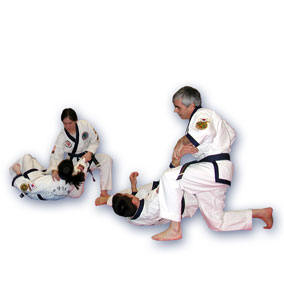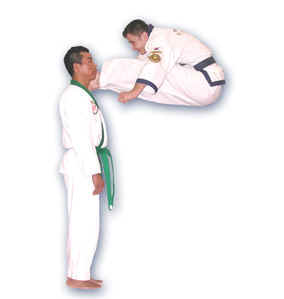
FAQ
A
Poor Instructor:
Makes a lot a noise like a stone
in an empty can; do not take time explain, and takes no time to
spend to make techniques better.
A Good Instructor:
Knows how to
properly explain.
An Excellent
Instructor:
Demonstrates by being his/her best example.
The Greatest of Instructors:
Inspires others by offering meaningful direction.

Q: I've seen many
schools which offer training in multiple styles and disciplines all
in one place. Which is better, the all-in-one school or a school
that specializes in one training discipline?
A:
To answer this, consider the following: If you are looking to have a
traditional Italian dinner, do you go to an Italian restaurant
specializing in traditional Italian dishes or do you go to a place
that serves Italian, Chinese, Japanese, and Mexican all in one
place? The answer is clear, if you want to gain true training and
experience in martial arts, you should choose the school that
specializes in one style or discipline. If you truly want to learn
multiple disciplines, it is recommended that you learn from separate
specialized schools.
Q: There are many
schools out there that claim to teach "traditional" and "true"
martial arts, how do I choose the right one?
A: As
it turns out, there are many schools out there that are taught by
"instructors" who become instructors by a variety of ways. Sometimes
they merely purchase "licenses" from the internet, or they may make
a one-time trip to another country and claim to have learned martial
arts, or some will even claim that they have experience by simply
saying "I trained with so-and-so". In order to find a good
instructor, you must take a look at the instructor's training
history. You should ask the following questions: How long did the
instructor train under his/her own instructor? Did the individual
earn his/her black belt from that instructor? Does the instructor
come from a lineage of instructors who have also earned their
degrees from their instructors? Was the instructor required to pass
a strict test for instructor certification by an accredited
association, federation, or union?

Q: How do I know
that my child will receive real martial arts training?
A:
Many schools are out that simply run as a business. These kinds of
schools emphasize games, earning rewards, and easily obtaining the
next degree resulting in ungrounded confidence and happiness,
letting children think they know martial arts. However, they do not
stress the importance of discipline, respect for others, and true
self-confidence. Before committing to a school, be sure to take the
time to sit in and watch a class to see how the children behave and
practice. Take a look at the students' precision, strength, balance,
and spirit.
Q. What is the major
difference between Tang Soo Do, Tae Kwon Do, Karate, and ...?
A:
Basically, most martial arts are the same. Foot and hand techniques
have the same basis in the way the human body is used. The
difference is in the instruction and what is emphasized in the
martial art. For example, some emphasize more kicking and others may
emphasize more hand techniques. While some schools are traditionally
focused, others may stress competition.
Q. How to choose a right martial arts
school?
A. The quality and background of the
instructors
a. History and roots of the school
b. Certified instructors
A. The quality of the school
training facility
a.
Size and layout of the training areas
b. Equipment such as mats
and training tools for safety & learning
c. Overall cleanliness
and appearance
A. The quality of
the school amenities
a. Proper heating and cooling
b.
Comfortable and large waiting room
c. Private office
d.
Restrooms and changing rooms
A. School curriculum and
requirements
a. Not
too business – some schools frequently “up sale” extras such as
classes, equipment and training programs.

The School
A martial arts school should be neat,
clean, and professional.
Be wary of "Black Belt Factories". Many
schools solely focus on getting through belt tests without regard
for precise or quality techniques.
The Schedule
Find out
how many times you or your child can practice a week. Find a
schedule that works for you.